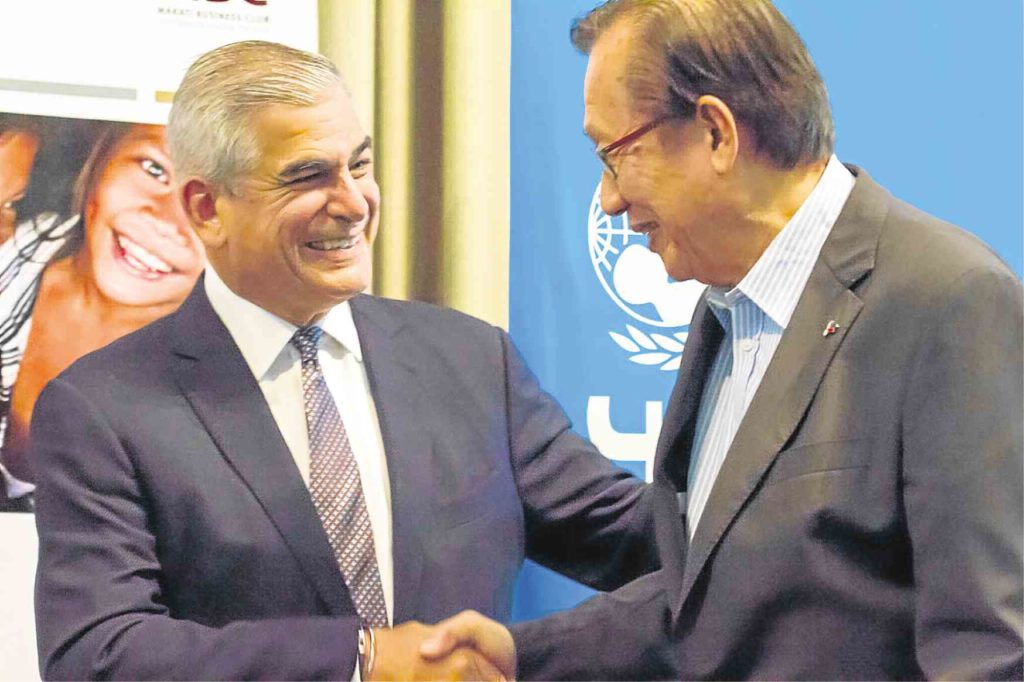Zobel named UN SDG champion
Two years ago, the United Nations’ 193 member-states mapped out a 15-year roadmap to eradicate extreme poverty, battle inequality and injustice and protect planet Earth. At the heart of “Agenda 2030” are the 17 Sustainable Development Goals (SDGs), a powerful aspiration for improving the world.
Together with governments, citizens and civil society, the business sector is seen to play a crucial role in meeting these SDGs.
The world’s largest corporate sustainability coalition, the UN Global Compact, thus calls on companies to align strategies and operations with universal principles on human rights, labor, environment and anticorruption, and take actions that advance societal goals.
Each year, the UN Global Compact celebrates a group of “SDG Pioneers,” defined as leaders doing an exceptional job of taking action to advance the UN-backed 17 sustainable development goals or SDGs.
Hundreds of nominations are received from diverse regions of the world, from which 10 finalists are selected, exemplifying how business can be a force for good in addressing the challenges faced by global society.
Article continues after this advertisementJaime Augusto Zobel de Ayala, chair and chief executive officer of 183-year-old conglomerate Ayala Corp., is part of the honor roll for 2017, the first executive from the Philippines to receive this citation.
Article continues after this advertisementHe was named SDG Pioneer for sustainable business strategy and operations.
Value system
For UN Global Compact, corporate sustainability starts with a company’s value system and a principled approach to doing business. This means operating in ways that, at a minimum, meet fundamental responsibilities in the areas of human rights, labor, environment and anti-corruption.
“Responsible businesses enact the same values and principles wherever they have a presence, and know that good practices in one area do not offset harm in another. By incorporating the Global Compact principles into strategies, policies and procedures, and establishing a culture of integrity, companies are not only upholding their basic responsibilities to people and planet, but also setting the stage for long-term success,” the coalition said.
Zobel and other SDG Pioneers will be recognized during the UN Global Compact Leaders Summit 2017 this Sept. 21 in New York. This is a two-day gathering of the private sector, UN, government and civil society to jump-start action to achieve the UN Sustainable Development Goals by 2030.
Over 800 leaders from around the world will gather in New York to identify how to unleash the business activities, thinking and innovation required for a new era of sustainability.
Each of the 2017 SDG Pioneers exemplifies how companies and pioneering individuals could be a force for positive change in addressing the challenges faced by society today, said Lise Kingo, UN Global Compact CEO and executive director.
A UN SDG Pioneers selection group, comprised of experts from the UN, academia, civil society and the private sector, ranked this year’s nominees based on a set of criteria, resulting in the 10 2017 UN Global Compact SDG Pioneers.
Aside from Zobel, other honorees this year are: Charles Immanuel Akhimien, co-founder, MOBicure Integrated Solutions in Nigeria (SDG Pioneer for maternal and children’s health); Gustavo Perez Berlanga, corporate social responsibility senior vice president at Toks Restaurant Group in Mexico (SDG Pioneer for empowering indigenous peoples); Tânia Conte Cosentino, president of Schneider Electric South America in Brazil (SDG Pioneer for energy management and sustainability); Teresa Jennings, head of rule of law development at LexisNexis (RELX Group Plc) in the US (SDG Pioneer for the Rule of Law); Sonia Bashir Kabir, managing director at Microsoft in Bangladesh (SDG Pioneer for women’s digital empowerment); Arthur Kay, founder and chair of Bio-bean in UK (SDG Pioneer for recycling waste into energy and biochemicals); Patrick Pouyanné, chair and CEO of Total in France (SDG Pioneer for driving partnerships for low-carbon investments); Kaan Terzioglu, CEO at Turkcell Iletisim Hizmetleri A.S. in Turkey (SDG Pioneer for supporting refugees through mobile technology); and, Joseph Thompson, co-founder and CEO at AID:Tech in UK (SDG Pioneer for blockchain technology).
Long-term sustainability
“Mr. Zobel has been impactful in reaching a wider segment of the business market through innovation and diversification. He has been a pioneer in the inclusion of long-term sustainability in business strategy and operations,” Kingo said.
Under Zobel’s leadership, Ayala has embraced shared value creation, integrating the developmental challenges that society faces into Ayala’s strategies and core business models.
Apart from reinventing its business models to meet the needs of a wider segment of the population, Zobel is also credited for leading Ayala’s foray into sectors critical to national development and inclusive progress: Power, infrastructure, healthcare, and education.
Under Zobel’s leadership, Ayala shifted to the integrated reporting framework, which captures in detail the group’s positive impact on society through its contribution to the SDGs.
The 183-year-old conglomerate is the first company in the Philippines to produce such as an integrated report.
Furthermore, Ayala is moving to include long-term sustainability targets for its businesses, which will form part of the companies’ and management’s key result areas.
Zobel, who leads the seventh generation in the family running Ayala Corp., has received multiple recognitions for his public service and support of economic development in the Philippines, including the Presidential Medal of Merit, the Philippine Legion of Honor and the Order of Mabini.
“I believe that now, more than ever, a deeper engagement with society is indispensable to the survival and success of private enterprises. From both a practical and moral standpoint, businesses cannot thrive in an environment rife with economic inequity,” Zobel said in a statement last week. “Ignoring these issues threatens our ability to create long-term value and jeopardizes the sustainability of the enterprise and markets.”
